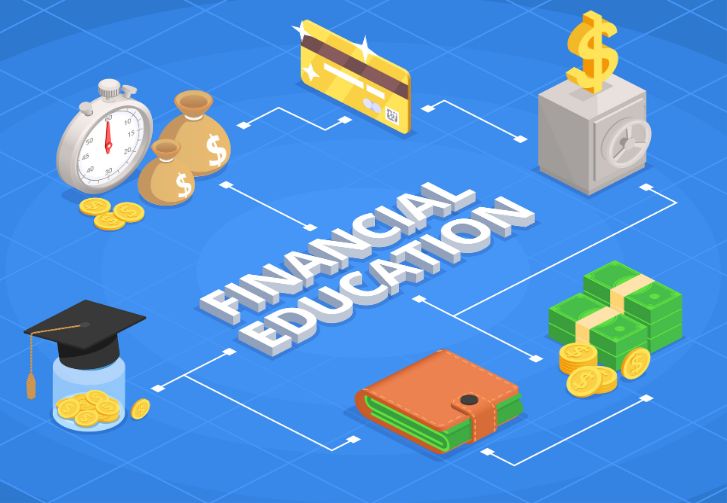
Financial literacy is a skill that should be considered as essential to a student’s education as reading, writing, and arithmetic. While the education system often focuses on academic subjects, the practical knowledge required to navigate the complex world of personal finance is often overlooked. In this blog, we will explore why financial education is crucial for every student and the key aspects they should learn to secure their financial future.
Let us get every detail for the same and get the top understanding to help students in their early stages.
Financial Education for Students
Being financially literate puts everyone in trouble. Whether they are students, the earliest, or the elderly. What if every student in their early stage is taught to be aware financially of every expense they make? This is one of the serious concerns that everyone needs to take for a better tomorrow. The same will help with the skill to manage and provide better management. When you get to have this thing for your children. You will be able to reach them better for the management even though you give your children pocket money too.
So, keeping all this in mind and providing the necessary skills like financial education will help them with the top information they want to have for them. We have discussed everything below to provide you with the information. You can check each point to help students get to have a skill they need for them. Check out all the points we have added below to provide you with the comprehensive information you need to have for you.
Why Financial Education Is a Must for Every Student?
When you let the students gain the skill of financial management. The students will be able to have the top skills like having an understanding of budgeting, savings, investing, debt management, credit score, text, financial planning, financial institution, insurance, financial literacy, economic concepts, and the last one is to have ethics and responsible finance. These are the top things that will help every student be prepared for the future. Check all the points for finance for students. We have added the top points to explain what you think in detail. Check them all for a comprehensive understanding.
1. Budgeting: The Foundation of Financial Success
Budgeting is the cornerstone of effective financial management. It involves creating a plan for how you will allocate your income to cover expenses, save, and invest. Every student should learn how to create and stick to a budget. This skill helps individuals live within their means, avoid overspending, and establish a solid financial foundation.
2. Savings: Building a Safety Net
Teaching students the importance of saving money regularly is a vital lesson. Whether it’s for emergencies, short-term goals like buying a car or going on a vacation, or long-term objectives such as retirement, savings play a pivotal role. Learning to save early in life can lead to financial security and the ability to seize opportunities when they arise.
3. Investing: Growing Wealth Over Time
Understanding the basics of investing is a skill that can potentially lead to long-term wealth accumulation. Students should be introduced to various investment options, risk assessment, and the concept of compounding interest. This knowledge will empower them to make informed investment decisions and build wealth over time.
4. Debt Management: Avoiding Financial Traps
Debt is a double-edged sword. It can be a useful tool for achieving goals like homeownership or higher education, but it can also lead to financial distress if not managed responsibly. Students should learn about different types of debt, interest rates, and strategies for managing and eliminating debt effectively.
5. Credit Score: Your Financial Reputation
The concept of credit scores and credit reports should be demystified for students. A good credit score is essential for accessing loans and favorable interest rates. Understanding how to build and maintain a strong credit history is crucial for financial success.
6. Taxes: Navigating the Tax Landscape
Basic knowledge of income taxes, including how to file tax returns, deductions, and tax-advantaged accounts like IRAs and 401(k)s, is vital. This understanding ensures that students are not caught off guard when they start earning income.
7. Financial Planning: Setting Goals for the Future
When one gets to practice financial planning they learn short-term and long-term goals to be achieved in the top way and show the roadmap to achievement too. Whether it’s buying a home, starting a business, or retiring comfortably, students should learn how to create and execute a financial plan that aligns with their aspirations.
8. Financial Institutions: The Financial Ecosystem
Understanding the roles of banks, credit unions, and other financial institutions in managing money and accessing financial services is essential. Students should know how to open and manage bank accounts, use ATMs, and access online banking services.
9. Insurance: Protecting Your Financial Future
Basic knowledge of insurance types (e.g., health, auto, life) and their importance in protecting against unexpected events is valuable. Students should understand how insurance works and how to choose appropriate coverage.
10. Financial Literacy: Making Informed Decisions
Financial literacy is not just about knowing financial concepts but also about developing critical thinking skills. Students should be able to evaluate financial products, make informed decisions, and avoid scams and predatory practices.
11. Economic Concepts: Understanding the Bigger Picture
A basic understanding of economic principles, such as inflation, interest rates, and supply and demand, can help students make sense of the broader financial landscape and how it affects their personal finances.
12. Ethical and Responsible Finance: Doing Well While Doing Good
Teaching students about ethical and responsible financial behavior, such as avoiding predatory lending practices and making socially responsible investment choices, can create a generation of financially conscious and ethical consumers.
These are the top points everyone must know in their early stage. The same will help with better understanding and getting to know each other. How they can be financially stable and have peace of mind.
Conclusion
In a world where financial decisions impact nearly every aspect of our lives, financial education is not just a nice-to-have but a must-have for every student. It equips them with the knowledge and skills to manage their finances effectively, reduce financial stress, and work toward achieving their goals. Parents, schools, and policymakers must prioritize financial education to empower future generations to make informed financial decisions and secure their financial well-being. By providing students with a strong foundation in financial literacy, we can set them on a path to a more financially secure and prosperous future. If you are looking for more such information and want to get the specific information to be covered. You can connect with us to get the information you need. You can also comment below to ask for the information you are looking for. We will help you get the information you are looking for.








